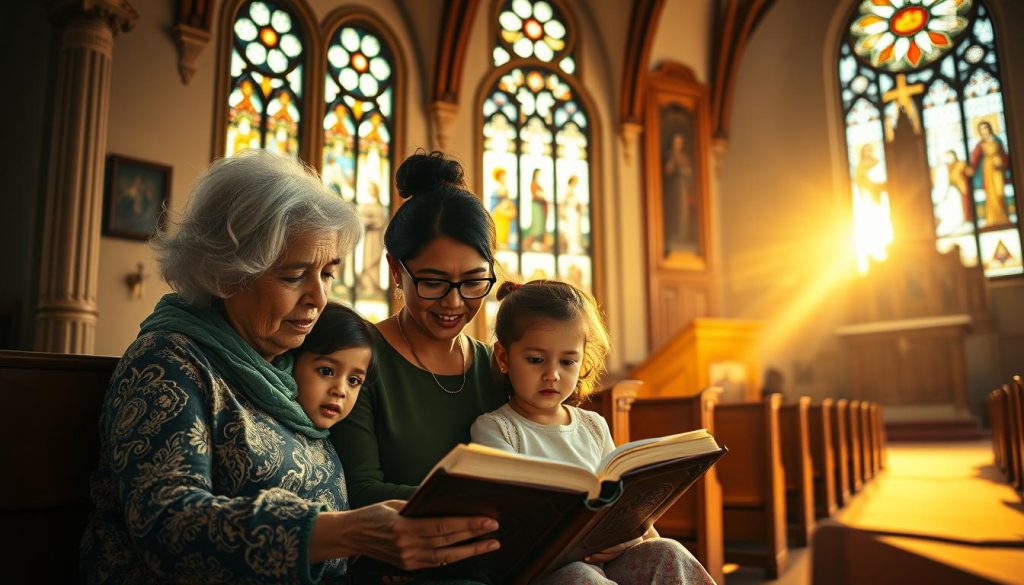Have you thought about the wisdom older Christians can share with the younger ones? Through our faith journey, intergenerational Christian mentoring gives us valuable lessons and strong connections. We dive into how to pass on faith and the good that comes from growing spiritually together. Our goal is to connect different ages, creating bonds that honor God and make our church stronger. Let’s discover the vital part we all have in sharing our faith journey.
Biblical Examples of Mentorship and Succession
The Scriptures show us strong examples of mentorship. It highlights how leadership and faith can grow and last. The story of Moses and Joshua stands out. As Moses’ time came to an end, he passed his leadership to Joshua. This was a key event in Christian leadership. It is described vividly in Numbers 27:15-23. Here, Moses, with God’s guidance, gives Joshua the power to lead the Israelites.
Moses taught Joshua well, preparing him for a big job. The “passing of the baton” was more than just a change of duties. It was a process full of care and preparation for the future. By doing so, Moses showed the true nature of Christian leadership. This teaches us a lot.
These stories from the Bible show us how to lead today. They teach us how more experienced leaders can help the younger ones grow. They can do this by sharing wisdom and sparking spiritual growth. This prepares them for important roles in our faith communities. As we think about Moses and Joshua, we’re reminded to keep faith-based leadership strong by mentoring well.
The Importance of Mutual Learning
In our Christian communities, mutual mentorship is key to growth. Older Christians share their wisdom and faith experiences. This helps younger Christians grow with confidence and grace. Mutual learning is special because it works both ways. Young Christians bring new energy and ideas. This makes the church more vibrant and keeps our faith strong. This sharing of wisdom makes everyone grow stronger together. It brings us closer to Christ and to each other.
Working together, older and younger Christians create a perfect balance. Their combined strengths help the church to flourish. This way, Christian learning is always moving forward and benefits everyone.
| Aspects | Older Christians | Younger Christians |
|---|---|---|
| Experience | Vast and varied | Fresh and evolving |
| Perspective | Rooted in tradition | Innovative and dynamic |
| Impact | Guidance and wisdom | Vitality and new insights |
The Role of Christian Counseling
Christian counseling is key in helping different generations within the church connect. It offers a way to understand age-related differences with kindness. This approach fosters a learning environment filled with Christian morals. In these sessions, both the young and old can share their viewpoints. This sharing bridges the gap between generations with faith and respect. We see faith-based support as vital for healing and growing spiritually. Christian counselors also open up paths for mentoring between age groups. Their guidance lays down trust and teamwork. Hence, Christian counseling does more than solve individual problems; it builds a united church community.
How the Church Community Can Foster Intergenerational Relationships
Our church community is lively and full of faith. It’s important to bring people of all ages together. This makes our journey in faith stronger and unites our church. Hosting church events for all ages is a great idea. For instance, having worship services where young and old pray and sing together. These shared moments foster respect and build connections across generations.
Mentoring programs are another good move. Experienced church members can guide the younger ones in their faith. This helps everyone feel important, no matter their age. Having Bible study groups with people of various ages is also useful. Everyone can share their thoughts and learn from each other. This encourages understanding and brings everyone closer. Doing service projects together is a smart way to connect generations. Whether it’s mission trips or local charity work, working together brings us closer. It shows the power of our community when we work as one.
To keep everyone involved, we should create special groups. These groups would plan activities that everyone likes. They should have members from all age groups to be fair.
| Activity | Age Group | Purpose |
|---|---|---|
| Combined Worship Services | All Ages | Shared Spiritual Experience |
| Mentoring Programs | Older & Younger Members | Personal Growth & Wisdom Sharing |
| Interactive Bible Study Groups | Mixed Ages | Inclusive Discussions |
| Service Projects | All Ages | Teamwork & Community Engagement |
By starting these programs, our church becomes closer and more caring. Every person feels they belong and are valued. This way, we build a strong, spiritual community that spans all ages.
Older and Younger Christians: Bridging the Generational Gap
Bridging gaps between generations in churches is both hard and rewarding. Working on it brings us closer as Christians. It helps us build strong ties across ages. By valuing what each generation offers, we create understanding and a united community. One way to connect is through open talks where everyone shares stories and insights. Churches can hold events that bring all ages together. This way, younger people learn from elders, and elders get to see faith in a modern light.
Mentorship and joint service projects are key too. They let different ages work together and learn from each other. This does not just bring us together, but it also makes our faith community more welcoming and lively. Worship services that appeal to all can help too. Mixing old hymns with new songs and involving everyone in leading shows unity. This way, worship shows our shared understanding and teamwork.
In short, talking openly, respecting each other, and working together are crucial for unity. By connecting more, our community gets stronger. It’s all about sharing our faith and learning from one another.
Lessons from the Bible on Passing the Torch
The Bible teaches the value of passing on faith and maintaining spiritual legacies. It shows us how Moses mentored Joshua as his time came to an end. By doing this, Moses secured the future of God’s mission. The story of Elijah and Elisha is another powerful example. Before Elijah left this world, he handed over his prophetic duties to Elisha. This act was a symbol of passing on spiritual power and wisdom. Elisha didn’t just take over; he received twice as much of Elijah’s spirit, showing the depth of their spiritual legacy.

In the New Testament, Paul and Timothy’s relationship highlights the need for new leaders. Paul took Timothy under his wing, guiding his spiritual journey and preparing him for service. His letters to Timothy stressed the importance of teaching, encouragement, and leading by example to preserve the spiritual legacy.
| Example | Mentor | Mentee | Key Lesson |
|---|---|---|---|
| Moses and Joshua | Moses | Joshua | Godly leadership succession |
| Elijah and Elisha | Elijah | Elisha | Receiving a double portion of spirit |
| Paul and Timothy | Paul | Timothy | Nurturing through letters and mentorship |
The Bible clearly tells us to hold dear and share our faith. By mentoring, encouraging, and being good examples, we inspire the youth to carry on the faith mission.
Addressing Generational Myths in the Church
Understanding the views between different age groups in the church can be hard. Sadly, many myths and stereotypes create misunderstandings, blocking unity and progress. It’s key to challenge these stereotypes to create a welcoming and loving community. A common belief is that younger people care less about spirituality or church. But, young Christians want deep, real connections with God that relate to their lives. We need to truly connect with them and value their ideas.
Also, it’s often thought that older members of the church don’t like change. Yet, many value new ways of sharing their faith and learning. Challenging these views helps us learn from their wisdom, creating respect and a culture of learning. The church’s lessons stress the need for unity and learning from each other. Verses like Joel 1:3 and Psalm 78:4 tell us to share God’s deeds with everyone. This helps us understand each other better, making our community stronger and more united.
By facing these myths, we respect what everyone brings to our community. This makes our church vibrant, diverse, and shows our love for God and each other.
Practical Steps for Implementing Intergenerational Learning
Churches can introduce intergenerational learning through simple, initial steps. This ensures everyone, young and old, can participate and grow. Begin with small projects and gradually include more activities to connect different generations.
Start by involving everyone in church activities. These can be small projects or big events like retreats. Suggesting pilot programs during church planning is a good first step. Developing mentoring programs is also vital. By pairing young people with experienced mentors, they can share wisdom and build strong friendships. It’s important to organize these programs well to make sure everyone benefits.
It’s important to encourage leaders of all ages within your church. This approach fosters unity and teamwork. Listening to people from different generations helps understand their needs and views.

Organize projects that bring different generations together, like service projects. These efforts strengthen the community and teach the importance of service. Patience and open communication are key. Finally, it’s important to constantly check and adjust church activities to be more inclusive. Sharing stories of God’s work in your community can inspire and keep everyone engaged.
- Start with practical, manageable activities.
- Implement mentoring programs for mutual learning.
- Promote multi-generational leadership.
- Organize joint service projects.
- Assess and adapt current ministries for inclusivity.
- Communicate inspiring stories and results.
Conclusion
As we explored biblical mentorship, mutual learning, and Christian counseling, their value to our faith communities became clear. Older and younger Christians coming together enriches both groups. It creates a bridge of wisdom and energy, making our collective faith stronger.
The church plays a key role in valuing generational diversity. It helps break myths and promotes a united faith journey. By making space for dialogue and mentorship, we build cooperation and growth. It’s about sharing and growing in Christ’s love together, not just passing responsibilities.
We encourage everyone to keep building these important relationships. Doing so helps our mission and improves our Christian community. Let’s work towards a future where all generations support and uplift each other. This will lead to a stronger, more connected, and spiritually vibrant church community.

